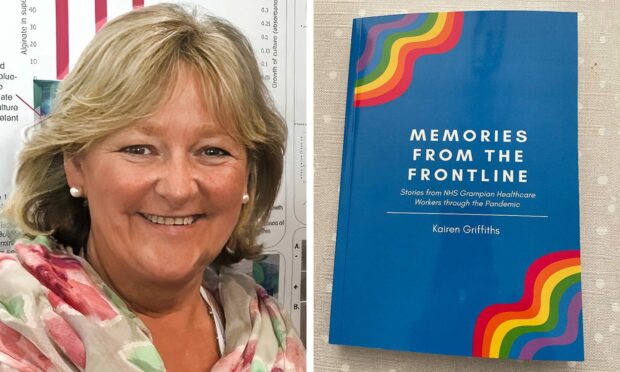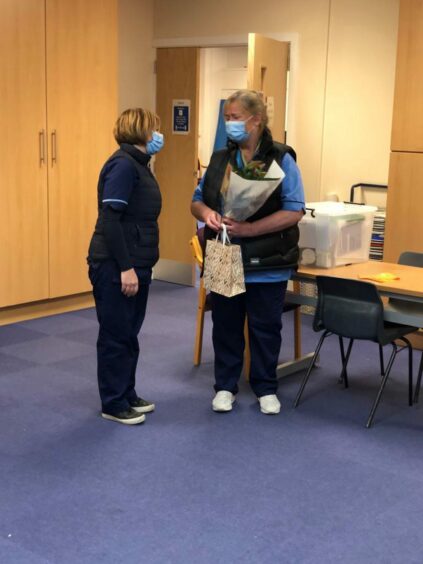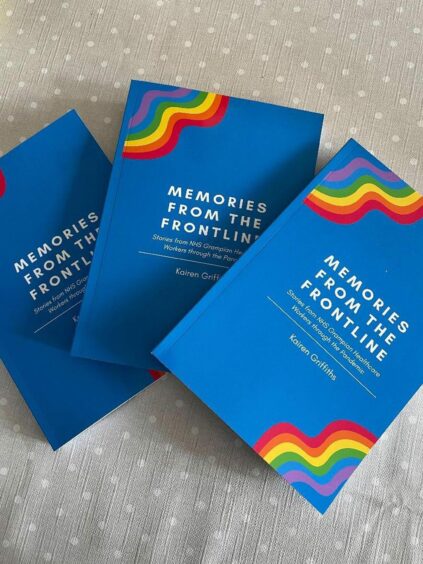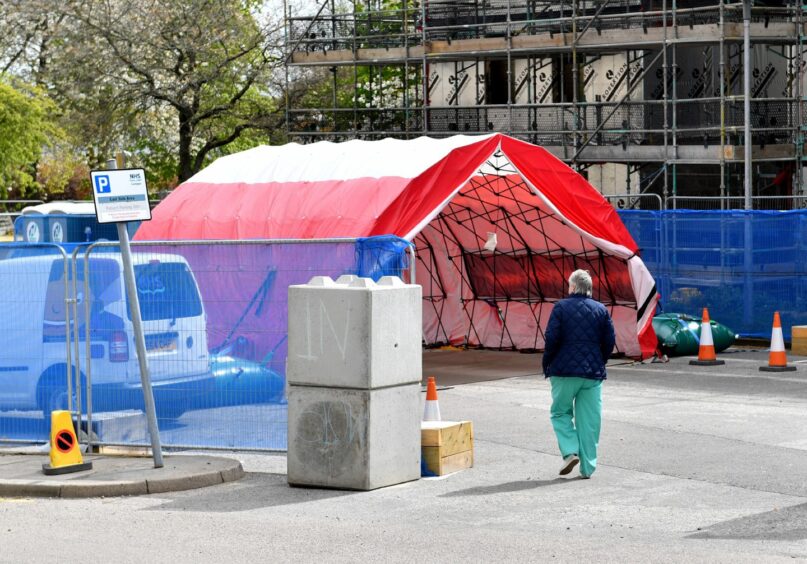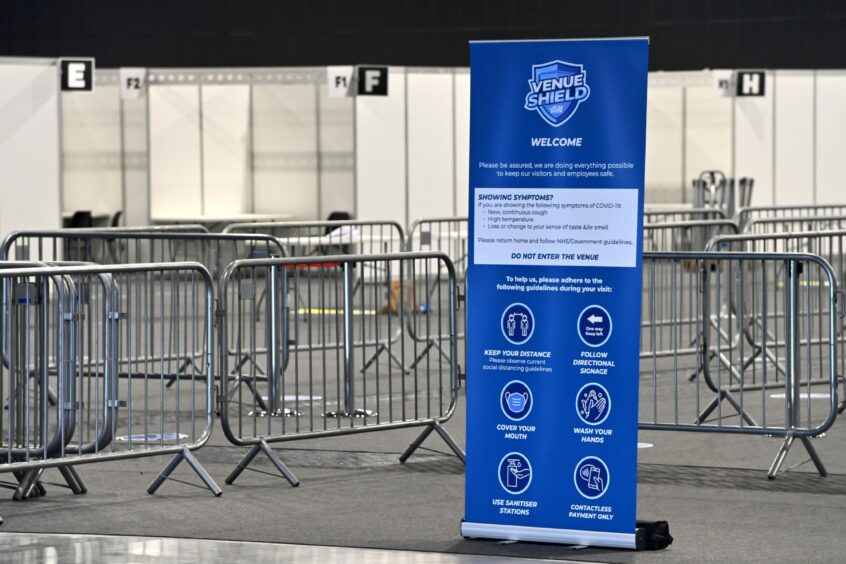In March 2020, as the UK shut down for the first pandemic lockdown, Sharon Falconer was bundled into a car and driven to Balmoral.
There was a suspected Covid case in the royal residence and Sharon, an NHS Grampian infectious disease nurse, was chosen to carry out the swab tests.
Test kits in hand, the nurse arrived at Balmoral only to be faced with an estate in lockdown. Everyone was isolating, and Sharon had to go room to room to do the throat swabs.
There was tension in the air as Britain’s most famous family faced the same unknown virus that had thrown the country into turmoil.
“Everyone in Balmoral was isolating from each other and staff were leaving meals outside the doors,” Sharon recalls.
“Everyone was very scared – there was still so much of the unknown.”
Stories from the pandemic’s frontline
This peek behind the scenes of Balmoral is just one many amazing stories in a new book from former NHS nurse and Banchory resident Kairen Griffiths.
The author, who herself worked in an Aberdeenshire testing centre during the pandemic, spent months speaking to the NHS Grampian workers, managers and leaders that shaped the region’s response to the planet’s biggest medical emergency since the Spanish Flu.
The book, called Memories From the Frontline, reveals in candid interviews with staff the many surreal and unusual situations they found themselves,
Often taken from backroom positions, or brought back into the NHS after years away, these people quickly turned into hardened veterans of the fight to contain Covid.
And amid the chaos was the constant drumbeat of loss as doctors and nurses witnessed patients dying at unprecedented rates.
In one chapter of the book, a religious education trainee teacher parachuted into Aberdeen Royal Infirmary’s intensive care unit describes how all five patients in one ward died in the time between her first and second shift.
Speaking to the P&J, author Kairen says it was the stories from the Covid ICU wards, where the most extreme cases were cared for, that affected her the most.
“That really humbled me,” she says. “I didn’t realise quite how hard it was for them.”
What really happened in NHS Grampian hospitals during Covid?
Kairen started researching the book after seeing an interview on TV with a hospital porter about his experiences of the pandemic.
She realised the public knew only a fraction of what was going on behind hospital doors when Covid was at its peak.
“We were hearing an awful lot about the doctors and the nurses, and the epidemiologists, and but we didn’t really hear very much about other people doing that doing the sort of key work during the whole pandemic,” she says.
“I just thought we need to hear these stories as well.”
She spoke to frontline staff including nurses, domestics and, of course, a porter – this time one in Aberdeen Royal Infirmary who movingly recalled the guilt she felt when taking any time off.
There are other voices, too. Aberdeen Royal Infirmary’s hospital chaplain, for example, proud to be known as the “chaplain of the coffee shop” because of the amount time he spent there chatting to people.
Kairen also spoke to the people leading the emergency care – those who devised the contact tracing programme and led the vaccination teams.
All of these people reveal in their own words the fears, the joy and the – often downright – weirdness of those lockdown months.
That so many were willing to do so initially came as a surprise to Kairen. But a common theme soon emerged from her interviews, which were carried out across the summer last year.
Many staff felt the country was already forgetting about the pandemic. Talking to Kairen was their way of ensuring a record was kept.
“I think for some, it might have been quite cathartic as well,” the author adds. “I was a little bit worried about dredging up bad memories for people. But I didn’t need to worry about it.”
The knock-on effects of the Covid pandemic
The range of experiences detailed in the book is as varied as its voices. The hospital porter praises the weekly clapping by the public on behalf of the NHS staff. Elsewhere, a nurse manager says it made her feel uncomfortable.
No one, however, has anything nice to say about the PPE – the masks, gowns and other protective gear that kept staff virus free but was miserable to wear.
There’s not much love, either, for unvaccinated patients that by the time of the third lockdown took up the majority of ICU beds.
An occupational therapist recounts the story of an intensive care patient who was both against the vaccine and any medical intervention.
He woke up in the ICU with a tube in his throat. Even though he couldn’t speak he ranted at the medical staff who had just saved his life.
For Kairen, however, one of the saddest realisations when writing the book was how many NHS Grampian staff have left their professions in the wake of the pandemic.
One ICU nurse told her that out of a team of 60, only 10 were left.
“I knew not a lot of nurses had left, but when you hear it like that, that’s a huge number,” Kairen says.
Kairen believes many of the issues facing the NHS today, such as strike action and staff shortages, are a direct knock-on from those pressure-filled months in 2020 and 2021.
As many in the north-east start to try past the pandemic, its legacy continues to affect us all.
Memories from the Frontline is available from Amazon with an RRP of £12.99. A launch event will take place in Banchory’s Scout Hall on Dee Street on Sunday May 14 featuring a Q&A with Kairen hosted by former BBC journalist Jane Grieve.
